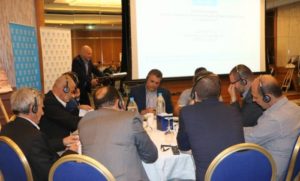Lebanon is home to over 400,000 Palestinian refugees, some 215,000 of whom live in camps. They include descendants of those who fled from Palestine during the 1948 Arab-Israeli War.
In 1962, Palestinians were categorized as foreigners in Lebanon, regardless of how long they had lived there. Non-Lebanese, which included the refugees, were restricted from working in over 70 skilled professions until 2005, when new legislation officially opened 50 such jobs to them.
The civil war left Lebanon’s government and the general Lebanese populace deeply suspicious of Palestinian refugees, because of their involvement in the Lebanese war. The current residents of the camps are currently denied access to their homeland or neighboring Arab nations.
The Nahr al-Bared Palestinian refugee camp (NBC) is 16 km north of Tripoli. The Lebanese military fought a three-month battle in 2007 against the al-Qaeda-inspired Fatah Islam group inside the camp.
The Lebanese army crushed the group, but the clashes also killed more than 170 soldiers and caused massive destruction, displacing the camp’s residents. Almost a decade later, the reconstruction work is still not finished and many residents are still waiting to return.
The Nahr el-Bared Camp was totally destroyed during those 2007 battles, leading to the displacement of over 27,000 Palestine refugees. Since then, with the support of the Lebanese Government and the international donor community, UNRWA has been engaged in its largest-ever individual reconstruction project, with an estimated cost of US$ 345 million dollars. The reconstruction project is 54 per cent complete in spite of many challenges.
“Almost half the construction has been made but there are still so many people waiting to be returned,” United Nations Secretary General Ban Ki-moon said in March of 2016. “I’m urging the international community to provide remaining funding of at least 200 million dollars so that these people can return.”
On October 11, 2017, the United Nations Relief and Works Agency for Palestine Refugees in the Near East (UNRWA) held a workshop in Beirut, Lebanon on the reconstruction of the Nahr el-Bared Camp. It was convened by the Director of UNRWA Affairs in Lebanon, Claudio Cordone.
The workshop brought together representatives of the refugee community of NBC and other key stakeholders including Lebanese and Palestinian officials and donors’ representatives. UNRWA senior coordinator for the NBC reconstruction project, Yvan Sturm, and his team presented the plans for the reconstruction, based on the available funds, and sought initial feedback from the participants. Further discussion will take place in the near future on the details of the reconstruction plans.
UNRWA also presented a way forward to complete the reconstruction of the entire camp, which remains subject to bridging the current budget gap of $106 million USD. The representative of the General Directorate of Antiquities, Dr. Assaad Seif, explained the process adopted in order to preserve and document archaeological findings.
Claudio Cordone stressed that UNRWA remained fully committed to speeding up the reconstruction of NBC with available funding and to expand the number of donors in order to complete the work as quickly as possible. He acknowledged the dire conditions of many families awaiting return to NBC while reiterating UNRWA’s commitment to seek funds to enhance such assistance.
“The NBC project ultimately is about human beings and human dignity, not just buildings. We need to strengthen trust and work together in addressing all aspects of this project,” Cordone told the participants.
Participants at the workshop also discussed how to improve communications among the different stakeholders and in general how to enhance a partnership approach. A number of proposals were discussed, which UNRWA and the other stakeholders will pursue further. They include a regular newsletter and regular meetings with all relevant parties, as well as a body to work in partnership.
UNRWA is confronted with an increased demand for services resulting from a growth in the number of registered Palestine refugees, the extent of their vulnerability and their deepening poverty. UNRWA is funded almost entirely by voluntary contributions and financial support has been outpaced by the growth in needs. As a result, the UNRWA Programme Budget, which supports the delivery of core essential services, operates with a large shortfall. UNRWA encourages all Member States to work collectively to exert all possible efforts to fully fund the Agency’s Programme Budget. UNRWA emergency programmes and key projects, also operating with large shortfalls, are funded through separate funding portals.
UNRWA is a United Nations agency established by the General Assembly in 1949 and mandated to provide assistance and protection to some 5 million registered Palestine refugees. Its mission is to help Palestine refugees in Jordan, Lebanon, Syria, West Bank and the Gaza Strip achieve their full human development potential, pending a just and lasting solution to their plight. UNRWA services encompass education, health care, relief and social services, camp infrastructure and improvement, protection and microfinance.
Featured photo of Nahr al-Bared © 2007 UNRWA.


